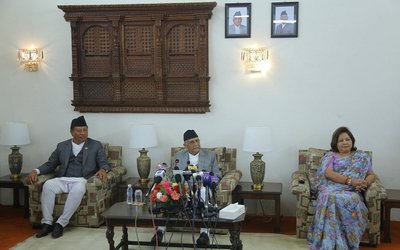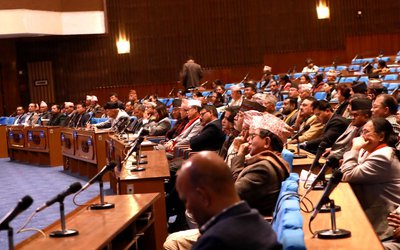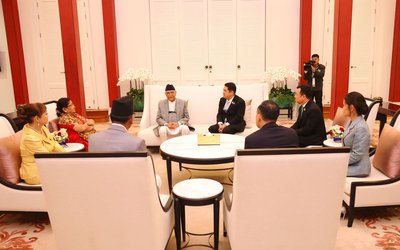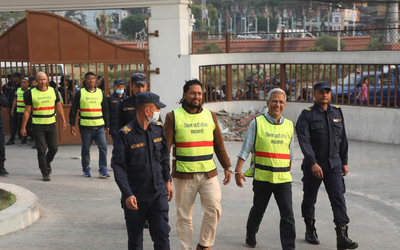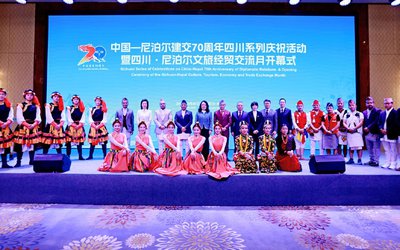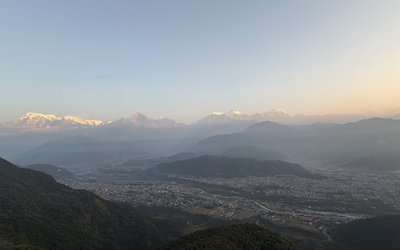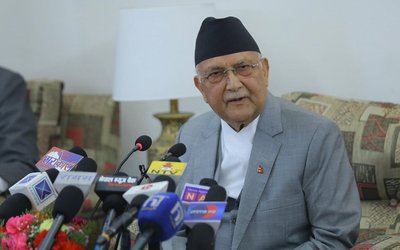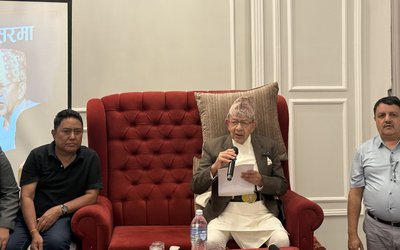
A two-day inception meeting of two projects, namely “Trade and Transport Facilitation Audit in South Asia” lead by South Asia Watch on Trade, Economics and Environment (SAWTEE) and “Promoting Micro, Small and Medium Enterprises (MSMEs) for Inclusive, Equitable and Sustainable Development in South Asia” lead by UNDP Asia Pacific Regional Centre (APRC), Bangkok, both supported by the Australian Agency for International Development (AusAID), started in Kathmandu today.
In his inaugural remarks, Chief Guest, Minister Shanker Prasad Koirala, stated that the cost of trading within the region among South Asian countries is twice, and in some cases, even three times, than trading with countries outside the region. That explains the importance of improving trade facilitation in South Asia. Despite the existence of several regional efforts, such as Agreement on South Asian Free Trade Area (SAFTA), intra-regional trade in South Asia has remained extremely modest due to a number of factors, one of which is trade and transport facilitation-related bottlenecks. Thus, he expressed hope that the two projects will create a momentum in South Asia and contribute to transforming the region into an international trading hub.
Glenn White, Australian Ambassador to Nepal, stated that since the latest Aid for Trade Report has highlighted the importance of regional projects for enhanced trade, the current initiatives taken by SAWTEE, UNDP APRC and their regional partners would be extremely beneficial in advancing regional economic integration in South Asia.
Shoko Noda, Country Director of UNDP Nepal, pointed out that unrealized economic potential of women was getting increasing recognition in the global political and economic sphere. South Asian countries, which hold immense potential in advancing MSMEs, andin which a large number of women are engaged, will not only contribute to increase economic growth of these countries but also empower women.
Iqbal Tabish, Secretary General of the SAARC Chamber of Commerce and Industry, mentioned that benefits of trade liberalization will not be realized unless trade facilities are rationalized. He also reported that 75 percent of MSMEs in South Asia are operating informally and argued that informality of MSMEs has limited their growth potential. Therefore, bringing them within the legal purview of the state can lead to higher growth of the sector.
Speaking as the Chair of inaugural session, Dr. Posh Raj Pandey, Executive Chairman, SAWTEE, mentioned that despite the fall in traditional trade barriers, costs related to trade facilitation, infrastructure and transit have risen over the years, which has promoted informal trade in South Asia. It has also forced exporters, businesses and consumers to bear additional cost burden. Therefore, for effective trade integration, trade facilitation is a must, he stated.
Dr. Ratnakar Adhikari, Chief Executive Director, SAWTEE, welcomed the participants on behalf of the organizers and highlighted the main features of the projects and their objectives. He stated that the trade facilitation audit study project will aim to identify regional benchmark for trade facilitation measures in South Asia, assess the cost incurred due to lack of regional trade connectivity and thickness of borders, as well as the benefits of removing trade barriers, and most importantly, estimate the investment required to address the identified bottlenecks. Similarly, the other project will focus on identifying market access barriers faced by MSMEs and advocate for the removal of such barriers.
More than 50 participants, including researchers, policy makers, private sector representatives and media, among others, from different South and Southeast Asian countries are participating in the inception meeting.
- IME GROUP: Expands Into Paper Industry
- Mar 24, 2025
- CPN UML: Instigated By India
- Mar 23, 2025
- ADB’S CHIEF ECONOMIST: Nepal Reduces Poverty
- Mar 11, 2025
- FM DR. DEUBA: A Successful Visit
- Mar 11, 2025
- MD GHISING: Target Of Personal Grudge
- Mar 09, 2025
